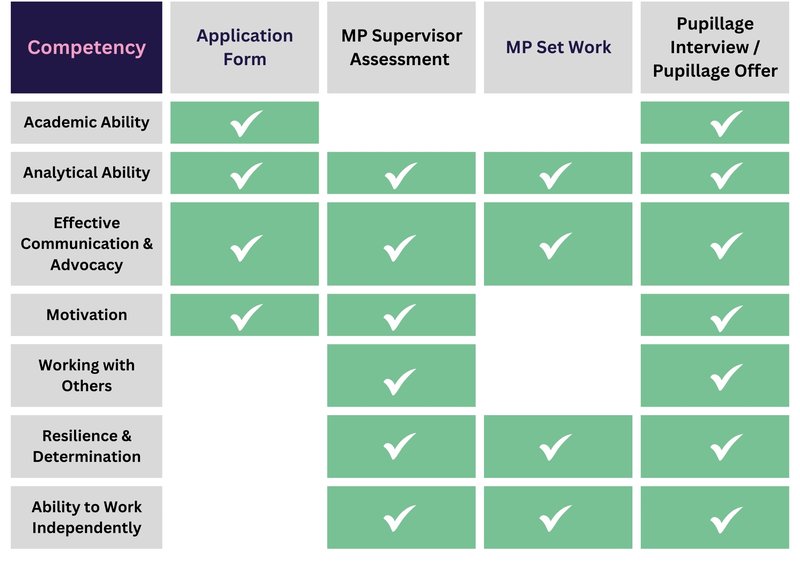Pupillage is, first and foremost, about giving you the skills you need to be a barrister. We are proud of our reputation for providing a legal training which is second to none.
The information provided here is intended to help you to complete your application form fully, to provide us with the information we need and give you the best possible chance of selection for mini-pupillage.
Please see our Pupillage Brochure. You will also find relevant information in the Selection Criteria and Guidance Notes for 2024-25, both of which should be essential reading before you begin your application.
Equal Opportunities
All barristers, clerks and staff are fully committed to diversity and inclusion within Blackstone Chambers and the Bar generally, and to equality of opportunity for all.
It is Chambers’ policy to treat everyone fairly and equally. Candidates for pupillage and tenancy are assessed, and offers of pupillage made, solely on merit.
We take proactive steps to review and continually improve all aspects of the administration and life in Chambers, and to ensure and improve equality of access to pupillage, training practice development, and employment opportunities within our organisation.
We always consider requests for reasonable adjustments to be made during the course of our applications process so as to remove or reduce disadvantages experienced by applicants with disabilities. Such adjustments might include (by way of non-exhaustive examples) the provision of information in alternative formats, easily accessible interview and mini-pupillage venues, or extra time to prepare for or undertake assessment.
A request for reasonable adjustments should be made in the first instance to the Pupillage Manager, Nicola Hall, and will be considered by the Pupillage Committee in conjunction with chambers’ Equality and Diversity Officers as appropriate.
“Barristers at Blackstone are formidable and ever-present figures at the Bar. ”
Pupillage Standards
“Such a glittering assortment of rankings does not come Blackstone's way without it being home to an equally bright array of legal superstars" ”
Pupillage Gateway
We will soon be recruiting for pupillages beginning in September 2027. All applications for pupillage are made through the Pupillage Gateway.
This platform, provided by The Bar Council, is intended to make the pupillage application process more transparent and fair for everyone. You can view our advertisement from Monday 24 November 2025 and can apply from Monday 5 January 2026. Applications close on Thursday 22 January 2026.
The Pupillage Gateway employs the Rare Contextual Recruitment System (CRS) when processing applications. The CRS uses national data to map the social, financial and educational background of candidates so as to ensure that all candidates of merit and potential are identified during recruitment processes and thus given the appropriate chance to flourish. All applicants to the Gateway are given the opportunity to consent to their personal information being processed by the CRS and the result of such analysis being provided to Blackstone Chambers for consideration at the outset of the application process.
For more information about the Pupillage Gateway please refer to the Pupillage Gateway website www.pupillagegateway.com, or contact the Bar Council: 020 7242 0082, or www.barcouncil.org.uk.
Finances
For pupils, we currently offer a pupillage award of £90,000 for pupillage commencing in 2027. Pupils may draw down up to £30,000 during their BPC year.
These figures are not affected if, like many of our pupils, you are successful in obtaining further financial assistance from your Inn. Our award may be reviewed during the currency of the application process.
For mini pupils, we offer financial assistance of up to £250 in respect of travel and/or out-of-pocket accommodation expenses incurred by candidates undertaking a mini pupillage with us. In exceptional circumstances additional funding may be available. Please contact Nicola Hall for information.
Information about awards which are available from the Inns of Court may be found here:
What we look for
1.1 Formally assessed qualifications at degree level, including any postgraduate degrees, and professional or vocational qualifications. (Note that we treat the GDL, and an accelerated law degree, as a postgraduate degree in this context.)
1.2 Academic awards, scholarships, prizes, and/or publications of exceptional note.
1.3 Academic references (but only at the final interview shortlisting stage).
2.1 Deals effectively with written, numerical and spoken information.
2.2 Approaches a large amount of information in a structured manner.
2.3 Efficiently distinguishes between relevant facts and irrelevant information.
2.4 Relates facts to applicable legal principles where relevant.
2.5 Unpicks complex arguments.
2.6 Does not over-interpret information or make unwarranted assumptions.
2.7 Demonstrates good judgment.
3.1 Communicates clearly, (giving sufficient background information to aid understanding without overloading audience).
3.2 Structures communication to aid understanding.
3.3 Adapts style and language of communication to the needs of the audience.
3.4 Presents complex legal points simply and accurately.
3.5 Listens to others and builds on their points.
3.6 Builds logical, rational arguments based on fact.
3.7 Predicts objections and has arguments ready to address them if raised.
3.8 Is able to influence the audience persuasively.
4.1 Demonstrates a realistic understanding of what a career as a barrister entails, including positive and negative aspects of the role.
4.2 Demonstrates motivation and commitment to a career as a barrister.
4.3 Demonstrates a strong motivation for a career at Blackstone Chambers and relevant practice areas.
4.4 Has researched and understood the Blackstone Chambers practice areas.
5.1 Builds effective working relationships with a range of different people.
5.2 Works well as part of a team.
5.3 Treats others with courtesy and respect.
5.4 Understands and empathises with different points of view.
6.1 Remains calm, objective, confident and in control under pressure.
6.2 Is comfortable and skillful in handling conflict/opposing views.
6.3 Focuses on achieving outcomes.
6.4 Works to get round obstacles; does not give up.
6.5 Is proactive in shaping what gets done, being aware of own boundaries.
6.6 Ensures deadlines are kept and promises met – demonstrates a good work ethic.
7.1 Demonstrates ability to work independently.
7.2 Able to rely on their own judgment when guidance cannot be found elsewhere.
7.3 Does not get distracted or demotivated when working alone.
Assessment
Mini Pupillage
As a mini pupil you will spend three days in Chambers, so that you can gain a useful insight into life at Blackstone Chambers.
You will normally be with one or two members of Chambers, but may also have the opportunity of seeing the work of others.
The object of a mini pupillage is for you to get to know us and for us to get to know you and assess your aptitude for a career in Blackstone Chambers.
You will be asked to undertake a set piece of work on one of your days in Chambers – this set work is common to all candidates in your applications year. Candidates’ work will be anonymised and formally assessed by a small panel of barristers from Blackstone.
Further information on mini pupillage is available in the Q&A section of this site.
References, University Certificates & Transcripts
We will not take up references or require university certificates or transcripts until a candidate’s application has progressed through to offer of an assessed mini pupillage.
We will contact you at the relevant time to make this request.
References do not form part of the mini-pupillage assessment process and will only be considered by the Pupillage Committee if you are offered a final pupillage interview.
At that point we will require at least two academic references and a copy of your university official documents sent direct to [email protected]. We strongly advise that you have contacted your referees and your universities well in advance of these possible requirements so that these supporting documents can be submitted by 24 April 2026 at the latest. Any delay may prejudice the processing of your application.
If you are currently studying for the GDL, we ask that you forward at least one academic reference from your previous undergraduate/post-graduate studies. If it is some time since you completed undergraduate or other post-graduate studies, we understand that it may be harder to obtain academic references, and you may wish to submit a reference from a more recent work place and the GDL instead.
Please ask your referees to address the following matters in their references:
- Intellectual capabilities including analytical skills both oral and written
- General clarity of expression and effective communication skills
- Ability to react to pressure and general resilience
- Ability to work independently
- Ability to build working relationships and work well as part of a team
- Confirmation of examination results where known

